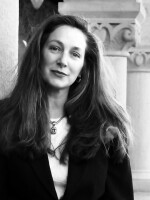
In the Americas, first ladies past and present are on the march to higher office.
While in the United States, Hillary Rodham Clinton seeks to fill her husband's old job, Argentina's first lady and senator Cristina Fernandez de Kirchner is on the verge of succeeding her own husband, President Nestor Kirchner.
Cristina Kirchner leads a field of 14 candidates heading into Sunday's presidential election. Pundits say chances are good that the 54-year-old lawyer, with a penchant for designer clothes, is likely to be elected in the first round of voting, taking the reins from her husband, and crowning the so-called "Clintons of South America" as the premier power couple.
Not since General Juan Peron's iconic wife Evita has there been such a buzz about a female politician in Argentina. In a political culture dominated by men in grey suits, Cristina's flowing auburn hair drapes over an impeccably tailored white suit. In her raspy voice, the diminutive wife of the president, who is widely credited with guiding Argentina's economic recovery after the 2001 collapse, delivers impassioned pledges to continue the renovation of Argentina.
She tells carefully orchestrated rallies of the Peronist Party faithful that the administration of Nestor Kirchner "is more than a successful government model, or an economic model. It is the reconstruction of values in Argentina. From Oct. 28 and forward we are going to ensure the reconstruction not only of the economic and political model, but the reconstruction of the values of work, health, housing, autonomy, family and national dignity," she says.
Psychologist and Cristina supporter Leticia Claverin, 27, says the fact that Cristina, a woman, is poised to become Argentina's next president is hugely significant in what she calls a macho-culture.
"The femininity generally associated with passivity is not the case with Cristina who has solid positions, articulates them and knows what she wants," Claverin says.
Cristina also encourages the belief that under her, things will remain much the same: her slogan is "we know what's lacking, and we know how to fix it."
Parallels with Hillary
Just as Hillary Clinton took an active role when Bill Clinton was president, Cristina Kirchner has also been one of her husband's top advisers since he took office four years ago amid Argentina's economic crisis. Like the Clintons, the Kirchners met in law school and when Nestor Kirchner was governor in Patagonia, Cristina Kirchner was a national legislator.
Rather than seek a second term, the popular Mr. Kirchner anointed his wife as his successor, hand-picking Cristina as the Peronist Party candidate. Critics, including economist Pablo Rojo, say the move was an assault on democracy.
"Sharing the power with your own wife — that's a monarchy, not a republic," Rojo says.
But political scientist Sergio Berensztein says the nepotism behind Cristina's candidacy will not bother many Argentine voters who are satisfied with the economic status quo.
"We are sort of resigned to accept high levels of corruption as long as we have growth and jobs. And that's, I think, a critical but yet accurate description of this administration," Berensztein says.
A fragmented political opposition has also cleared Cristina's path to power. As she taps the traditional Peronist base of rural and urban poor, careful stage-managing is also smoothing her anticipated glide to election: she refuses to debate, avoids news conferences and tends to make choreographed appearances — abroad. Analyst Rosendo Fraga says her meeting with former President Bill Clinton in New York last month was most significant. Fraga sums up Cristina's pre-eminent political goal should she become president in one word: Hillary.
"She thinks the most important thing for her is to establish a new relationship with the U.S. if Hillary is the president — a real change in diplomatic style," Fraga says.
In a rare radio interview this week, Cristina Kirchner brushed aside comparisons with the U.S. former first lady, sounding eager to be seen as her own woman.
"We've both been senators and lawyers, but that's it," she said. "I don't want to be compared to Hillary Clinton, or Evita Peron, nor anyone."
Argentina's first lady and leading contender to become president said, "I don't believe in imitating. There's nothing better than being yourself."
Copyright 2022 NPR. To see more, visit https://www.npr.org. 9(MDAzMjM2NDYzMDEyMzc1Njk5NjAxNzY3OQ001))







